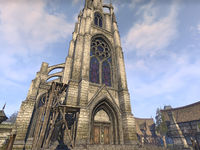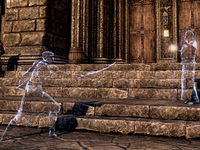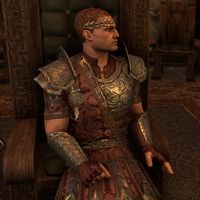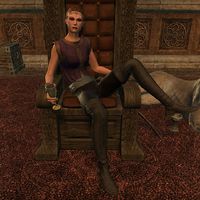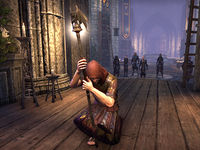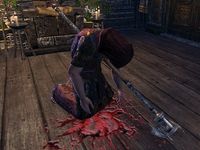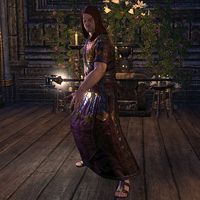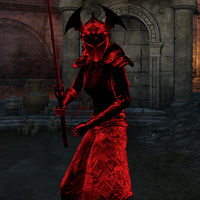Lore:Artorius Ponticus
| Primate Artorius Ponticus | |||
|---|---|---|---|
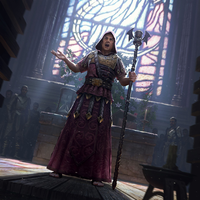 Primate Artorius Ponticus
Primate Artorius Ponticus |
|||
| Race | Imperial | Gender | Male |
| Born | 2nd Era |
||
| Died | 2E 582 Kvatch |
||
| Resided in | Kvatch | ||
| Previous Ruler | Jonas Coventine | ||
| Appears in | ESO, Legends | ||
Primate Artorius Ponticus (born Artorius Ancrus)[1] served as the leader of the Akatosh Chantry in Kvatch during the mid-Second Era. Based in the Great Cathedral of Akatosh, he was a very powerful and influential figure in the years leading up to the Planemeld in 2E 582.[2] A deeply spiritual man, Primate Artorius spent much of his life in service to Akatosh, who he truly believed guided and supported his efforts, and he was considered the primary religious authority of Cyrodiil.[3][4][5] As Primate, Artorius oversaw all aspects of Akatosh worship in the Cathedral. He was supported by Grand Chanter Surus and Grand Sermonizer Fithia, as well as the warrior-priests of the Order of the Hour.[6][4]
Despite his religious station, Artorious had a vast network of spies and informants throughout the Gold Coast and sought to shape its political landscape.[4] Nevertheless, many heralded him as a stabilizing force in the region for most of his primacy.[7] In his later years, he was involved in a feud with the Dark Brotherhood and a three-way power struggle for control of the Gold Coast.[2]
History[edit]
Early Life[edit]
Artorius Ancrus was born into the wealthy Ancrus family. With his two eldest brothers being expected to take control of the family's holdings and his other brother, Angelus, being an officer in the Imperial Legion, Artorius grew up without a clear place in the world. As the youngest of the four brothers, tradition dictated that Artorius would live his life in service to the Divines, much to his disdain.[3][7]
He was fascinated by the ongoing battles between Emeric of Wayrest and Durcorach in High Rock in 2E 542, so he scoured the Imperial City for anyone who could tell him more about the conflict and usually found them in the most unsavory sections of the city. It was there that he became acquainted with the notorious crime boss, Vodunius Monrius, and began to run errands for him, much to the chagrin of his father and older brothers. Artorius relished the role and the excitement that accompanied it until one day when he was collecting gold from the various merchants and artisans working in and around the Market District. Upon entering the shop of a Khajiiti baker named Sticky Paws, he found four officers of the city's guard waiting for him. The guard captain told Artorius that they could bring the full weight of the law down upon him, but that thanks to his father's wealth and influence, he would be allowed to serve his penance in the Temple of the Divines under the supervision of its priests.[3][8][7]
By the end of 2E 542, Artorius found himself in the Temple of the Divines serving his penance. Artorius was placed under the watch of Ilavius Alfeno, a priest of Akatosh, who eventually became his mentor. At the temple, Artorius performed an endless array of chores that included cleaning, food preparation, and helping to care for the shrines each day. He was also prescribed periods of study, meditation, and prayer. Artorius quickly became fascinated with the tales and tenets of the Divines, but had a particular affinity to Akatosh.[8]
When Primate Jonas Coventine arrived for his annual visit to the temple from Kvatch, he took an immediate liking to Artorius. After leading the temple in worship, the Primate invited Artorius to a private meeting. The details of the meeting are unknown, but shortly after, Artorius pledged himself to the Divines. When his year of service was over, he took the vows of the priesthood and devoted himself to serving Akatosh. Artorius longed to be assigned to the Cathedral of Akatosh in Kvatch, which he believed was the best place in Tamriel for him to serve and worship the Dragon God of Time. He used every avenue at his disposal to make himself enticing to the high priests and the Primate.[8][1]
Miracle of the First Shrine[edit]
When a man named Casiras the Hunter brought his young son to the temple with the shaft of an arrow jutting from his chest, Artorius immediately began rendering aid. Even though the terrible wound had clearly killed the child, Artorius led the grieving father to Akatosh's shrine and began to pray. Artorius reportedly prayed for three straight days, never pausing to eat, or drink, or even sleep. At the end of the third day, Artorius began to speak rapidly in a tongue that no one in the temple could understand. Then a burst of brilliant light emanated from the shrine, which struck Artorius and flowed through his body, down his arms, and into his hands before passing on to the dead boy. When the glow subsided, the wound was healed, and the child was alive. It was claimed that Akatosh had answered Artorius' prayers. Word of this reputed miracle, called "The Miracle of the First Shrine", spread throughout the Empire, quickly reaching the attention of Primate Jonas. He decided that if Akatosh was indeed performing miracles through one of his priests, then that priest needed to be at the Cathedral in Kvatch. Soon, Artorius was serving at the Cathedral of Akatosh under the close tutelage of the Primate.[1][7]
Artorius rose swiftly through the hierarchy of the Cathedral, eventually becoming Grand Sermonizer of Akatosh, second only to the Primate of Kvatch himself. Around 2E 560, the relationship between the Primate and Artorius became strained. Artorius wanted the clergy to become more involved in the growing political unrest spreading throughout the Empire, and with the increasing threat of the Knahaten Flu, but Jonas wanted the Cathedral to remain distant from secular issues. The two argued constantly about the subject, reaching the point where the Primate was prepared to put an end to the disagreement by sending Artorius to a distant posting.[1]
Accession to the Primacy[edit]
Despite his holy station, Artorius was ruthless and ambitious, conspiring to remove Jonas from his position. Although he later publicly preached against the evils of such cults and organizations, Artorius secretly performed the Black Sacrament and contacted the Dark Brotherhood to arrange Jonas' murder.[9] The Dark Brotherhood sent an assassin to Kvatch to carry out the contract.[10] The Brotherhood assassin Lyra Viria killed Primate Jonas in the Cathedral of Akatosh, and immediately after the Primate's murder, Artorius confronted the assassin.[11] Seeking his own personal champion, Artorius used Viria's insecurities and guilt over recently murdering her entire sanctuary to try to convince her that Akatosh wanted them to join forces and that the only way to atone for her sins and gain redemption was through him. This worked, and Viria pledged her blade and life to him and the dragon god. She became known as the Black Dragon and the First Sword of the Order of the Hour.[10][12]
Although it was claimed that Jonas died of natural causes, rumors spread throughout Kvatch that the Primate was assassinated by the Dark Brotherhood.[1][11] Regardless of the rumors, Jonas' death paved the way for Artorius to advance to the top of the Chantry's hierarchy. Artorius was elected the Primate of Kvatch, becoming the primary religious authority of Cyrodiil, and he changed his surname to Ponticus.[1][5] The famous loom artist Gloria Medilus created tapestries depicting Artorius' investiture to commemorate the ceremony.[13]
The Wolf and the Pirate Queen[edit]
During his reign, Artorius had a grudgingly civil relationship with Count Varen Aquilarios.[5] When Varen initiated a revolt against Emperor Leovic in 2E 576, his nephew Carolus Aquilarios was left behind to protect Kvatch. Still loyal to Leovic, Count Ephrem Benirus of Anvil sent Imperial forces to seize Varen's property and holdings, but Carolus repelled the attack with the aid of the Kvatch Warders. Although Artorius sought a more influential position in the city's hierarchy, he put aside his ambitions while Carolus worked to protect Kvatch.[5]
In 2E 577, Varen killed Leovic and declared himself emperor, so Carolus was officially named Count of Kvatch. However, as soon as Carolus was named count, Artorius began working to undermine his authority and carve out more power and influence for himself.[14][5] Unexpectedly, in the same year, Fortunata ap Dugal led a fleet of merchant warships and pirate vessels into Anvil Harbor, took control of the weakened city, and declared the Gold Coast to be a free and independent state.[15][16] When she requested that Kvatch join Anvil as part of an independent Gold Coast, Carolus refused, preferring to remain loyal to Varen. Fortunata did not feel confident enough to press the demand, but when Varen disappeared in 2E 579, she took advantage of Kvatch's sudden isolation and made her demands more forceful.[15] Ultimately, Fortunata's greater numbers prevailed, and Carolus had no choice but to swear fealty to an independent Gold Coast.[17] These events led to the birth of a three-way power struggle over the Gold Coast between Artorius, Fortunata and Carolus.[4][17]
In response to the aggression by Fortunata's forces, Artorius offered the assistance of the Order of the Hour to Carolus, which he reluctantly accepted.[18] After the outbreak of the Three Banners War in 2E 580 and the subsequent collapse of the Empire, Artorius set out to bolster the power and scope of the Order of the Hour. He instructed Commander Marcus Scipio to increase the size of the Order and work to expand its responsibilities beyond the boundaries of the Cathedral and into the rest of Kvatch. Artorius maintained that this was to reinforce the capabilities of the Kvatch Guard in the dangerous and troubling times.[19][4]
The Dark Brotherhood[edit]
Around 2E 582, given the volatile political situation, Artorius became concerned that the very organization that he employed to become Primate may be used against him.[9] He decided to move against the Dark Brotherhood and wipe them out. In order to achieve this, he first needed to locate their sanctuary on the Gold Coast. The Black Dragon was chosen to head this task; given her past association with the organization, she was charged with kidnapping suspected Brotherhood members and taking them to the At-Himah Family Estate, where Grand Sermonizer Fithia would interrogate them. They tortured several members to death, but none of them revealed the location of the sanctuary.[20][21]
Publicly, Artorius blamed the mysterious kidnappings and murders on the Dark Brotherhood, and ordered the Grand Sermonizer to deliver sermons urging Kvatch to stand against the Brotherhood.[22] Artorius also petitioned Carolus for emergency powers to once again convert the Order into an army to protect the Cathedral and Kvatch.[19] In response to the increase in murders, Carolus granted the Order of the Hour expanded rights and duties to supplement the efforts of the Kvatch Guard.[4] Carolus also granted Artorius the powers to once again convert the Order into an army, provided the Order returned to the Cathedral once the threat was resolved.[19][18] The Order's numbers expanded quickly, and it grew larger than it ever had in its history.[19] These moves unsettled Fortunata, who believed the Primate was building an army to eventually attack Anvil.[23] The Brotherhood responded to the sermons by murdering not only the chantry's street preachers speaking out against them but the Grand Sermonizer herself.[21]
Fortunata, still troubled by the expansion of the Order of the Hour, contracted the Brotherhood to kill Commander Scipio to show Carolus that the Order could not protect him.[23] The Brotherhood subsequently murdered Scipio, but in an unexpected turn of events, Carolus performed his own Black Sacrament to have the Brotherhood kill Fortunata to save Kvatch from her.[24][18] The Brotherhood accepted the contract and killed Fortunata in Anvil Castle.[25] With the Pirate Queen dead, Artorius capitalized on the situation and offered full and unconditional pardons to any Red Sails pirates who agreed to abandon their criminal ways and join the Order of the Hour. As a result, many members of Fortunata's old crew began flocking to the Enclave of the Hourglass to join.[26][18][27]
Eventually, the Brotherhood learned that the Black Dragon was working for Artorius and the Order of the Hour.[18] By this time, The Black Dragon had become disillusioned with Artorius' guidance and felt no sense of redemption.[12][28] She fled to the Order of the Hour's ancient headquarters, Knightsgrave, where the Brotherhood eventually cornered and killed her. Before she died, she revealed that Artorius had learned of the location of the Dark Brotherhood sanctuary and that he was planning on attacking it.[29][30] In response, the Brotherhood decided to launch a preemptive strike against Artorius and the Order before they could attack the sanctuary. Several Brotherhood assassins stormed the catacombs below the Cathedral of Akatosh and dispatched the forces of the Order of the Hour guarding the tunnels. Artorius confronted the assassins once they reached the main hall, using time magic to fight the assassins, but they still defeated him. As he lay defeated, a Brotherhood assassin impaled Artorius upon his staff, killing him.[31] With the Primate's death, this left Count Carolus as the only remaining power on the Gold Coast.
Gallery[edit]
See Also[edit]
- For game-specific information, see the Elder Scrolls Online
 article.
article.
Books[edit]
- The Primate: Before the Light by Midara Salviticus, Historian, University of Gwylim — Part one of a biography of Primate Artorius Ponticus
- The Primate: Finding Faith by Midara Salviticus, Historian, University of Gwylim — Part two of a biography of Primate Artorius Ponticus
- The Primate: Rise to Glory by Midara Salviticus, Historian, University of Gwylim — Part three of a biography of Primate Artorius Ponticus
- Gold Coast Notables A Report Prepared by Mirabelle Motierre for her Brothers and Sisters — A Dark Brotherhood spy's report on the notable persons of the Gold Coast
- Artorius Ponticus Answers Your Questions by Bishop Artorius Ponticus — A priest of Akatosh of the Temple of Kvatch answers questions on lore
- Meet the Character - Primate Artorius by Grand Sermonizer Fithia — A flyer surrounding the background of Primate Artorius
References[edit]
- ^ a b c d e f The Primate: Rise to Glory — Midara Salviticus, Historian, University of Gwylim
- ^ a b Events of ESO: Dark Brotherhood
- ^ a b c The Primate: Before the Light — Midara Salviticus, Historian, University of Gwylim
- ^ a b c d e f Gold Coast Notables — Mirabelle Motierre for her Brothers and Sisters
- ^ a b c d e The Wolf and the Dragon — Midara Salviticus, Historian, University of Gwylim
- ^ Cathedral Hierarchy — Chanter Amia
- ^ a b c d Meet the Character - Primate Artorius — Grand Sermonizer Fithia
- ^ a b c The Primate: Finding Faith — Midara Salviticus, Historian, University of Gwylim
- ^ a b Speaker Terenus' dialogue in ESO: Dark Brotherhood
- ^ a b A Ghost from the Past quest in ESO: Dark Brotherhood
- ^ a b Green-Venom-Tongue's dialogue in ESO: Dark Brotherhood
- ^ a b The Black Dragon's Journal — The Black Dragon
- ^ "Investiture of the Primate" Tapestry contraband item in ESO
- ^ Letter from the Governor — Fortunata ap Dugal
- ^ a b Pirate Queen of the Gold Coast — Midara Salviticus, Historian, University of Gwylim
- ^ Rise of the Red Sails
- ^ a b The Wolf and the Pirate Queen — Midara Salviticus, Historian, University of Gwylim
- ^ a b c d e Count Carolus Aquilarios' dialogue in ESO: Dark Brotherhood
- ^ a b c d Order of the Hour — Exordor Vasidius, Sermonizer, Priest of Akatosh
- ^ The Grand Sermonizer's Journal — Grand Sermonizer Fithia
- ^ a b A Lesson in Silence quest in ESO: Dark Brotherhood
- ^ Words of the Grand Sermonizer — Grand Sermonizer Fithia
- ^ a b Governor Fortunata ap Dugal's dialogue in ESO: Dark Brotherhood
- ^ Count's Correspondence — Count Carolus Aquilarios
- ^ A Special Request quest in ESO: Dark Brotherhood
- ^ Join the Order!
- ^ Conversation between Lieutenant Vinicius and Captain Marie Elena in ESO: Dark Brotherhood
- ^ The Black Dragon's Journal, Part 2 — The Black Dragon
- ^ Lyra Viria's dialogue in ESO: Dark Brotherhood
- ^ The Wrath of Sithis quest in ESO: Dark Brotherhood
- ^ Filling the Void quest in ESO: Dark Brotherhood
